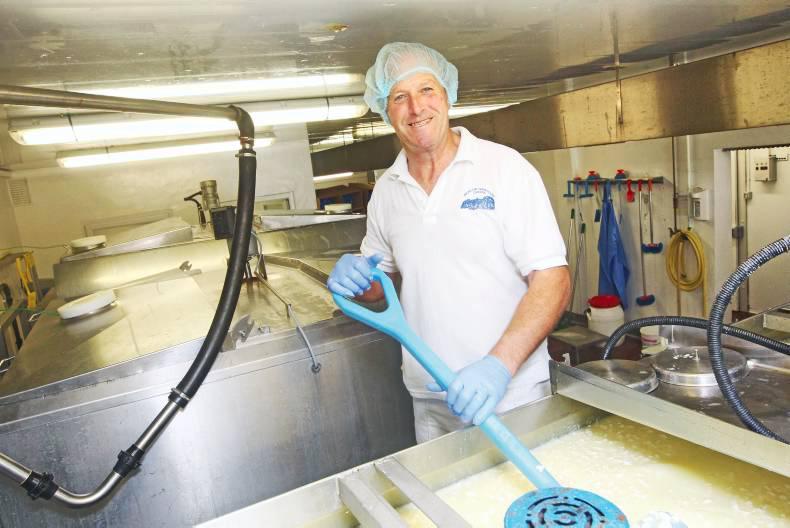It may have been Blue Monday when I visited John Hempenstall’s farm, but as I drove through the Curranstown countryside, outside Arklow, Co Wicklow, even the most depressing Monday feeling subsided. I couldn’t help but feel in awe of the beautiful surroundings that greeted me.
Even as our conversation began, John paid homage to the wonderful area he farms in.
“We are in close proximity to the sea here, there is no pollution and the air is crisp,” he notes.
The plethora of awards that hang on the wall of the office on the family-run farm would suggest the air does no harm to the cows either.
“We have done well of late,” John explains modestly. “We were the winner of the best soft cheese class at the Royal Bath Show 2015 (the show that replaced the British Cheese Awards) as well as winners of our class (the white rinded cheese, all milks) at the 2015 Bord Bia Irish Cheese Awards.”
As we sat down and spoke about the success of the cheeses among private sellers, restaurants and, in particular, wedding organisers, John took me back to the origins of Wicklow Farmhouse Cheese.
Where it began
Wicklow Farmhouse Cheese was founded in 2005 by John and his family.
“From the time I left school, I was involved with dairy. We produced milk 365 days a year and supplied Glanbia and Premier Milk. We had a good supply of milk but prices were so unpredictable and we knew milk quotas were going to be abolished. As relatively small producers, we realised it would be difficult to make this viable. That’s when I started to look elsewhere in the market.”
Thinking ahead, John started to research potential gaps in the dairy market, a process that began as far back as 2001.
“We went to the enterprise board and they gave us direction. From there we employed a qualified researcher who conducted market research for us. The process took a few months but, as a result, we found there was a gap in the brie market, so we decided this was the way to go.”
And so the wheels began to spin. A prototype of the product was made at the Moorepark research centre in Co Cork, which met the standards John wished to achieve, while work began on a production plant on the home farm.
“I studied mechanical engineering in DIT, so I was able to design the production plant myself,” says John. “This obviously had a big bearing on cost and time. We acquired the machinery from different sources and this part of the process took the longest.”
A year and a half to be precise, but John put this time to good use, finalising planning permission and health regulations with the different regulatory authorities.
Production began in 2005, using the milk produced on the farm, and while the intention may have been to make the cheese on a part-time basis, the swift increase in popularity led to them rethinking this idea.
“Once the word got out there, the business just grew and grew. After about a year and a half, Tesco and Superquinn began stocking our cheese, which increased sales hugely for us.”
Weddings
And then there is the wedding spreads. Talking to John, one would be forgiven if you thought him a wedding planner. His knowledge of what cheeses people want, the size and type, is second to none and he reassures me that the market is still growing.
“We began doing wedding spreads in 2011. I was quite surprised when I was approached first, which shows you how uncommon it was then, but it has grown so much in a matter of three or four years”.
The centrepieces of many modern weddings is the 100% cheesecake (not to be mistaken with its sweeter confectionery cousin) and these abnormally sized delicacies can cater for up to 250 people. But John is adamant that one can still have both the traditional fruit cake and cheese mix at their wedding.
“Many people we deal with will have the orthodox fruit cake at the reception and will go with the cheese cake, crackers and fruit later in the night, so there is definitely variety at weddings now,” says John.
The significance of the day isn’t lost on the Wicklow native either.
“We realise how big a day it is for people getting married. We sit down with them and make sure the spread they receive is exactly what they want. That is very important to us. You build trust with your customer, which is an important part of what we do.”
It seems it doesn’t stop at weddings either. The increase in this range of party food has now extended to communions, confirmations and private parties.
The future doesn’t look all that bad for the local producer either. Production and efficiency is the buzz word, as John intends to upscale operations in the coming years.
Forward thinking and humble in equal measure, John recognises the strides Wicklow Farmhouse Cheese has made and insists further progress can and will be achieved.
“We are proud of what the company stands for but we want to improve and expand all the time.”
Possibly the biggest testimony to Wicklow Farmhouse Cheese is the 16 local people it employs in its plant.
Not bad for a once threatened dairy farm.








SHARING OPTIONS